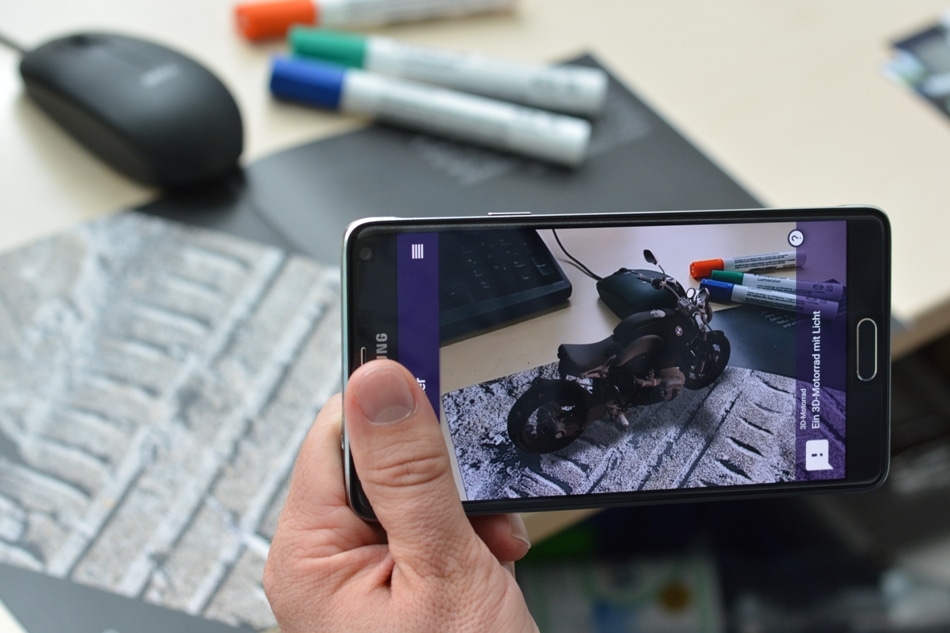Sep 8 2016
 With special apps � pictured here from the Bielefeld company Raumt�nzer � extra information from print media can be represented as augmented reality on a smartphone. Here, it appears as if a motorcycle were parked on top of the desk. Photo: CITEC/Universit�t Bielefeld
With special apps � pictured here from the Bielefeld company Raumt�nzer � extra information from print media can be represented as augmented reality on a smartphone. Here, it appears as if a motorcycle were parked on top of the desk. Photo: CITEC/Universit�t Bielefeld
Virtual reality (VR) not only helps companies to save money when testing new technologies, but it also enables students and trainees to intensively and rapidly learn on-the-job skills - for example in a virtual hospital.
Experts will display the latest advances and studies on augmented and virtual reality at the Cluster of Excellence Cognitive Interaction Technology (CITEC) of Bielefeld University from 8–9 September 2016. This conference will also conduct a competition where the researchers will display how augmented and virtual reality have the capability to improve the workplace of the future.
This conference brings together professionals and experts from both academia and the business world. In the CITEC Building’s foyer, visitors can personally experience the research prototypes and can also learn about virtual reality systems from the demonstrators.
The software company Virtalis provides an example of this kind of product, where users can interactively discuss and change 3-D constructions that are used for machines in real time. Although participation in the conference is free, visitors will have to register prior on the conference website.
With virtual reality, we can generate spaces and situations that help people learn to perform occupational duties. In virtual hospital rooms, for instance, aspiring healthcare professionals can train more quickly and cost effectively in routine tasks like inserting an intravenous injection. In many professions, certain tasks are performed over and over again to ensure that everything runs smoothly in emergencies or stressful situations. Training in ‘reality’ would require considerable resources, and students need a lot of space. In virtual reality, however, students and trainees can practice at their own pace until the processes become second nature.
Dr. Thies Pfeiffer, Computer Scientist
To do this all they require is a pair of virtual reality glasses with appropriate software. This enables various situations to be generated where the users are more occupied rather than just practicing in front of a computer monitor.
During the conference, research demonstrators from CITEC will be on display, like the virtual training space “ICSpace” and the smart data glasses from the Adamaas project. In ICSpace, the user will be guided by a virtual coach to correctly perform sports exercises – and will instantly point out mistakes.
The data glasses designed for the Adamaas project helps people, specifically those who have cognitive disabilities, in order to successfully complete daily routine activities. The glasses are capable of providing assistance, for instance, to perform the maintenance work for a coffee machine.
In addition to the prototypes the researchers will present studies on virtual and augmented reality, inclusive of the concept of reality simulator, which is capable of testing both software and hardware in virtual reality. The simulator is appropriate for programmers, who are involved in developing apps for smartphones.
It can simulate a pair of data glasses or a smart phone, which can be used by the programmer in order to check the effectiveness of the reason it is designed for. This kind of simulation is helpful even for applications that involve entire factory settings or larger buildings in which the programmers when seated at their computer only have to take a look through the virtual reality glasses, and can avoid traveling to the actual production facilities for which they are designing the software.
A spotlight of the conference held in the CITEC Building will be the competition known as “Virtual and Augmented Reality for the Workplace of the Future.” In this competition, the research teams will provide a research prototype, which will be examined by an expert jury. As a prize for the competition, the company Ceyoniq Technology GmbH donated a pair of virtual reality video glasses known as HTC Vive.
Ceyoniq is involved in developing software for document management and is one of the major sponsors for the conference, including Raumtänzer and Virtalis.
Additionally, the best research articles will be recognized with a “Best Paper Award,” which will in turn be chosen by both the steering committee and the organizing committee of the specialist group on virtual and augmented reality (Fachgruppe VR/AR) of the German Informatics Society (Gesellschaft für Informatik), who is responsible for organizing the conference. The “Journal of Virtual Reality and Broadcasting” will publish the winning articles in a special edition.
In the last 13 years, parties from academic and business world who are interested get together once a year for the “Virtual and Augmented Reality” conference, launched by the specialist group VR/AR. A comprehensive program overview and a list of exhibitors will also be provided. Event organizers are expecting about 100 participants to attend.
The Cluster of Excellence Cognitive Interaction Technology (CITEC) of Bielefeld University is one among the 43 clusters of excellence in Germany. CITEC is involved in making technical systems intuitive and easy to operate. Its interdisciplinary approach integrates cognitive science research with technology and engineering. From 2007, CITEC has been financially aided as part of Excellence Initiative of the federal and state governments of Germany. Nearly 250 scientists and academics conduct research at CITEC.